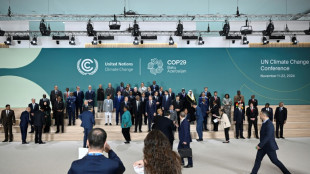
-
 Atletico make comeback to beat Alaves as Simeone hits milestone
Atletico make comeback to beat Alaves as Simeone hits milestone
-
Aid only 'delaying deaths' as Sudan counts down to famine: agency chief

-
 Leipzig lose more ground on Bayern with Hoffenheim loss
Leipzig lose more ground on Bayern with Hoffenheim loss
-
Arsenal back to winning ways, Chelsea up to third in Premier League

-
 Sinner powers Davis Cup holders Italy past Australia to final
Sinner powers Davis Cup holders Italy past Australia to final
-
Andy Murray to coach Novak Djokovic

-
 Leipzig lose ground on Bayern, Dortmund and Leverkusen win
Leipzig lose ground on Bayern, Dortmund and Leverkusen win
-
Fear in central Beirut district hit by Israeli strikes

-
 Chinese film about Covid-19 wins Taiwan's top Golden Horse prizes
Chinese film about Covid-19 wins Taiwan's top Golden Horse prizes
-
Tuipulotu puts anger behind him as he captains Scotland against native Australia

-
 Inter smash Verona to take Serie A lead
Inter smash Verona to take Serie A lead
-
Mass rape trial sparks demonstrations across France

-
 Eddie Jones will revel in winding up England - Genge
Eddie Jones will revel in winding up England - Genge
-
Storms bring chaos to Ireland, France, UK

-
 Berrettini gives Italy edge on Australia in Davis Cup semis
Berrettini gives Italy edge on Australia in Davis Cup semis
-
Amber Glenn storms to gold in Cup of China

-
 High-flying Chelsea see off Leicester
High-flying Chelsea see off Leicester
-
Climate-threatened nations stage protest at COP29 over contentious deal

-
 Families fleeing after 32 killed in new sectarian violence in Pakistan
Families fleeing after 32 killed in new sectarian violence in Pakistan
-
Ancelotti says 'ugly' to speculate about Mbappe mental health

-
 Failure haunts UN environment conferences
Failure haunts UN environment conferences
-
Colapinto in doubt for Las Vegas GP after crashing

-
 Lebanon says 11 killed in Israeli strike on central Beirut
Lebanon says 11 killed in Israeli strike on central Beirut
-
Three arrested in Spain for racist abuse at Liga Clasico

-
 Pope to skip Notre Dame opening for Corsica visit
Pope to skip Notre Dame opening for Corsica visit
-
Tokyo police care for lost umbrellas, keys, flying squirrels

-
 Neuville closes in on world title after Rally Japan recovery
Neuville closes in on world title after Rally Japan recovery
-
Jaiswal slams unbeaten 90 as India seize control against Australia

-
 'Nice surprise' for Verstappen to edge Norris in Las Vegas GP qualifying
'Nice surprise' for Verstappen to edge Norris in Las Vegas GP qualifying
-
Indian teen admits to 'some nerves' in bid for world chess crown

-
 Patrick Reed shoots rare 59 to make Hong Kong Open history
Patrick Reed shoots rare 59 to make Hong Kong Open history
-
Record-breaker Kane hits back after England criticism

-
 Cameron Smith jumps into lead at Australian PGA Championship
Cameron Smith jumps into lead at Australian PGA Championship
-
Russell on pole position at Las Vegas GP, Verstappen ahead of Norris

-
 Philippine VP made 'active threat' on Marcos' life: palace
Philippine VP made 'active threat' on Marcos' life: palace
-
Celtics labor to win over Wizards, Warriors into Cup quarters

-
 Balkans women stage ancient Greek play to condemn women's suffering in war
Balkans women stage ancient Greek play to condemn women's suffering in war
-
Nvidia CEO says will balance compliance and tech advances under Trump

-
 Grand Slam ambition dawning for Australia against Scotland
Grand Slam ambition dawning for Australia against Scotland
-
Japan game set to leave England with more questions than answers

-
 Amorim's to-do list to make Man Utd great again
Amorim's to-do list to make Man Utd great again
-
What forcing Google to sell Chrome could mean

-
 Fears for Gaza hospitals as fuel and aid run low
Fears for Gaza hospitals as fuel and aid run low
-
Anderson to Starc: Five up for grabs in IPL player auction

-
 Big money as Saudi makes foray into cricket with IPL auction
Big money as Saudi makes foray into cricket with IPL auction
-
Budget, debt: Trump's Treasury chief faces urgent challenges

-
 Trump names hedge fund manager Scott Bessent as Treasury chief
Trump names hedge fund manager Scott Bessent as Treasury chief
-
Putin vows more tests of nuke-capable missile fired at Ukraine

-
 Yin avoids penalty to keep lead as Korda charges at LPGA Tour Championship
Yin avoids penalty to keep lead as Korda charges at LPGA Tour Championship
-
With favourites out MLS playoffs promise more upsets


Greece pushes green transition on its fragile islands
Greece this week signed a clean energy deal with the EU in a bid to fast-track the green transition on its fragile islands threatened by overtourism and climate change.
Hundreds of Greek islands are facing major challenges including water scarcity, said Dimitris Lianos, the mayor of Naxos, the largest island in the Cyclades archipelago, where the deal was signed Thursday with the European Union and the European Investment Bank to finance decarbonisation projects.
The symbolism of signing it there was hard to ignore. Like on most of Greece's many islands, farms on Naxos are imperilled by drought.
The 1.6-billion-euro fund ($1.67 billion) will leverage the islands' main assets -- wind and sun -- to provide clean energy at affordable costs.
Investing in "green" energy sources will "allow the islands to achieve their ecological transition", said Prime Minister Kyriakos Mitsotakis.
"Renewable energy will help the country become self-sufficient and reduce energy costs," he said.
Greek islands depend heavily on liquid fossil fuels for their electricity supply, taking a toll on the environment and driving up costs.
- Overtourism -
Athens is focusing on developing renewable energy infrastructure -- offshore wind farms, energy storage systems and connecting the islands with the mainland for power supply.
Greece, which is at the forefront of global warming in the Mediterranean Basin, has been experiencing scorching summers and disastrous wildfires.
On many islands, residents are alarmed by water shortages and prolonged drought.
Even so, hostility to wind turbines is growing as it is in several European countries.
Environmental protection groups are also warning against overtourism, particularly in the Cyclades, popular for its crystal-clear waters and picturesque villages.
Naxos, south of Mykonos and east of Paros is becoming increasingly popular. But in 2023, this island known for its cheeses and potatoes, had only 270 mm (10.6 inches) of rain, compared to an average of 306 mm (12 inches), according to climate monitor the National Observatory of Athens.
On energy autonomy, Greece has so far given priority to smaller, unconnected and remote islands, like Chalki in southeastern Greece, which now boasts a solar power plant.
- Reducing emissions -
Power on the Dodecanese island of Tilos now almost entirely comes from renewables, thanks to an 11-million-euro investment from the EU and four private Greek investors.
Last month Greece unveiled ambitious solar and wind energy targets in a bid to achieve net zero greenhouse gas emissions by 2050.
Athens will aim to reach an 82 percent share of renewables in its electricity mix by 2030, up from the 66 percent planned in 2019, according to Environment and Energy Minister Theodoros Skylakakis.
The Mediterranean country is striving to reduce emissions by 58.6 percent by 2030.
Greece has already shrunk its emissions by 45 percent compared to 2005, Mitsotakis said in a speech at the COP29 summit in Baku earlier this month.
The premier also said that wind and solar energy covered "almost half of Greece's electricity needs" while the contribution from highly polluting lignite, or brown coal, was now "only 6 percent".
T.Vitorino--PC
